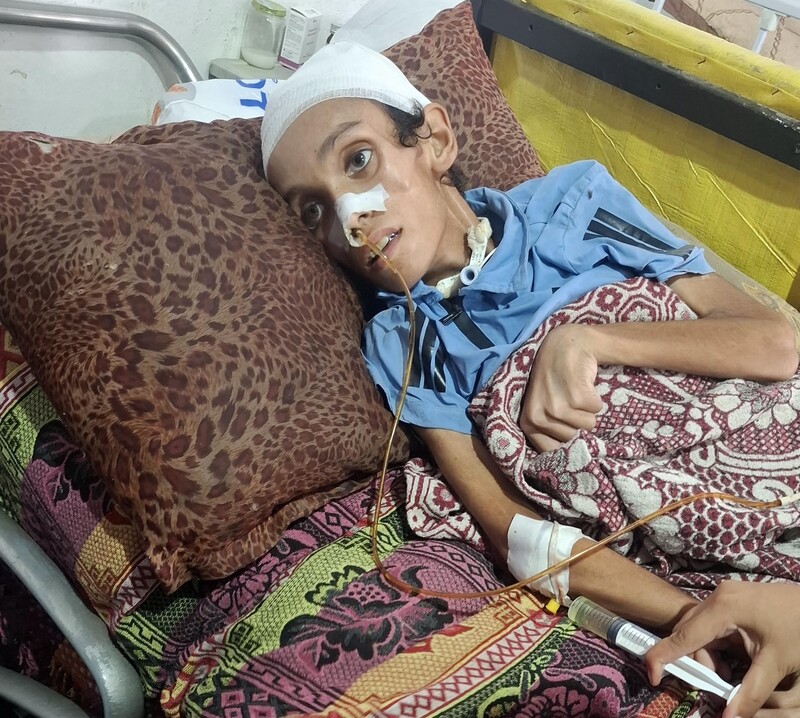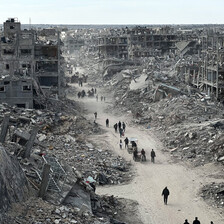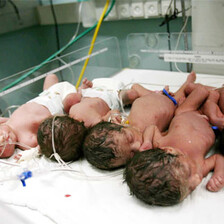The Electronic Intifada 29 September 2025

Musab al-Dibs in his hospital bed in July.
In an overcrowded ward filled with patients at Al-Shifa Hospital in Gaza City, Musab al-Dibs lay in a bed in late July, his body frail, his eyes bulging, his arms and legs thinner than fingers.
He was barely conscious. But after months in a coma, it was progress.
Musab, 14, is suffering from severe malnutrition that has caused serious complications to his health, including drastic weight loss, high body temperature and loss of consciousness.
His mother, Sehnaj, 46, was trying to feed him. She was using a syringe filled with mashed vegetables she had obtained from the hospital’s pharmacy.
It was the only treatment available for Musab given the collapse of Gaza’s healthcare system, severe medicine shortages and the near-total absence of food.
“When I saw my son in this condition, I didn’t recognize him. I fainted from the shock,” Sehnaj told The Electronic Intifada.
Musab had been critically injured in the head on 7 May when an Israeli airstrike struck near his family’s tent in the town of Beit Lahiya in northern Gaza. He was rushed to the Indonesian Hospital, where he was placed in intensive care due to the severity of his injuries.
On 17 May, Israeli forces besieged the hospital, leaving Musab – along with hospital staff and other patients – trapped inside for 20 days with little medical care.
“The hospital had no IV fluids, no medicines. Musab’s condition deteriorated badly,” his mother said.
Those who could, evacuated their loved ones in any way possible. It was not until June, however, that the World Health Organization (WHO) managed to move Musab to Al-Shifa Hospital. His condition was shocking to both his mother and the doctors there.
“His appearance had changed completely. I couldn’t recognize my own son,” Sehnaj said.
Conditions at Al-Shifa were not much better, with minimal resources and acute shortages of medicines. According to Sehnaj, the only thing the hospital can provide are small portions of mashed fruit or vegetable supplements.
“Musab’s treatment is food. He needs [fresh] fruits, vegetables, meat, milk and a healthy, balanced diet. Supplements are just that, a supplement, not the core of his nutrition. But there is nothing available in the markets, and even if something is found, the prices are beyond our reach,” Sehnaj told The Electronic Intifada.
Heartbroken
According to the WHO on 22 August, “more than half a million people in Gaza are trapped in famine,” a number that is expected to rise to 640,000 by the end of September if the situation doesn’t change.
On 2 March, Israel completely closed crossings into Gaza for aid. In late May, some aid was distributed at specified Gaza Humanitarian Foundation sites, or death traps as they are widely seen. More than 2,000 people have been killed seeking aid, according to Gaza’s ministry of health, including over 1,172 at GHF aid points in the over six months since they’ve been operational.
Food, medicine and infant formula are in effect weapons of war in Gaza. Children are not dying from bombs alone, but from empty stomachs, untreated illnesses and the deliberate denial of aid.
According to the latest figures released by the Gaza Ministry of Health on 19 September, more than 400 Palestinians – including 147 children – have died from starvation and malnutrition in Gaza since 7 October 2023.
In the nutrition department at Al-Rantisi Children’s Hospital in Gaza City on 23 July, a large number of parents were arriving with their children, who appeared visibly exhausted, with pale, yellowish faces and emaciated bodies.
The Electronic Intifada met with several of them. Among them was baby Judi al-Arouri, six months old, weighing just 2 kilograms, 5 kilograms less than the norm for a baby that age.
Judi is suffering acute malnutrition with accompanying complications like dehydration, low blood sugar, low body temperature and extreme weight loss. Doctors prescribed therapeutic milk F100 – an enriched milk powder – but it is not available in pharmacies or hospitals, her mother, Alaa, 25, said.
“I was suffering from severe malnutrition during pregnancy,” she added. “The doctors told me it had affected the fetus and that she was too small.”
Throughout her entire pregnancy, Alaa didn’t eat any healthy food, she told The Electronic Intifada.
“I only had lentils, pasta or rice once a day, and only if we received it from a public [charity] kitchen. I’m honestly ashamed to tell you that I haven’t felt full for a very long time.”
Breastfeeding was a struggle and when Alaa brought her daughter to the hospital there was no treatment or IV fluids available.
“The only thing provided is a nutritional supplement which tastes bad, and which she usually refuses,” Alaa said. “I’m heartbroken that her life has begun like this.”
Not asking for miracles
Lina Aziz, 26, shares similar pain.
“My daughter doesn’t get full from breastfeeding,” she said. “She keeps crying from hunger, and I can’t offer her anything. There’s no baby formula available, and if by chance we find it on the market, it’s outrageously expensive.”
Baby formula used to cost some $4.50 before October 2023. It has since fluctuated wildly in price, reaching as much as $66, before coming down again. A can of powder now fetches between $20-$25 when available.
Her daughter Aya, at four months old and just 3 kilograms, weighs less than half of what an average healthy baby is supposed to at that age.
Lina brought her to the hospital without diapers or milk. When staff asked what she fed her, they were shocked to learn that she had been preparing bottles of starch dissolved in water just to quiet the baby’s hunger. This caused Aya to suffer dangerously low blood sugar levels and acidosis – an increase in acidity in the blood.
“A child needs a healthy mother to be properly cared for,” Lina told The Electronic Intifada. “But we mothers are also exhausted by hunger. How can we care for our children when we ourselves are barely surviving? We’re not asking for miracles, we’re just asking for milk and food.”
Dr. Muhammad Baraka, 42, a pediatric nutrition specialist at Al-Rantisi Hospital, described the situation as catastrophic.
“A massive number of children with complications from malnutrition are coming to the clinic – something we’ve never seen before,” he told The Electronic Intifada. “This is the result of prolonged war and deprivation.”
With even a slice of bread a luxury, the vulnerable have been particularly affected.
“This [famine] has severely impacted children,” Baraka said. “It began with mild malnutrition, then moderate, then severe. Now we are seeing the most critical stage – with complications. What comes next is death.”
The children coming to Al-Rantisi Hospital are showing all the classic complications of malnutrition: skin issues, weakened immune systems, delayed mental awareness, heart and kidney problems, low blood sugar leading to seizures and electrolyte imbalances causing unconsciousness.
“These are conditions we used to read about in textbooks,” Baraka told The Electronic Intifada. “We are operating with the bare minimum and trying to save as many children as we can, but the mortality rate is high because the means to treat them are simply not available.”
Absurd
Proper treatment plans require therapeutic milk powders, with which, the doctor said, “we could save a significant number of children.” But Israel is blocking vital aid, including baby formula, antibiotics and IV fluids, from reaching Gaza.
“We’re facing huge challenges,” Baraka said. “Imagine a hungry doctor who leaves his starving children at home to come to the hospital, where he works with hungry colleagues who also left their own starving children behind to treat hungry and exhausted people.”
“There’s no formula milk,” he continued. “No antibiotics. No fever reducers. No IV fluids. We don’t even have baby bottles to prepare formula. It’s absurd.”
Sundus Hamada, 32, arrived at the emergency ward at Al-Rantisi Hospital with her son Muhammad, 6, who was running a high fever.
She was holding a cloth soaked in water, using it to try to cool down her frail child.
“There’s no fever medicine,” Sundus said. “I brought him here hoping for help, but even the hospital doesn’t have fever reducers.”
Muhammad suffers from muscular dystrophy, a genetic disorder. “But before the war, he lived in full health. He had a private doctor, a safe home, all the medications he needed, and he ate nutritious food,” Sundus told The Electronic Intifada.
Israel’s genocide in genocide has left Muhammad without a doctor, home, medicine and food and, though he has a referral to seek treatment outside Gaza, there is no possibility of leaving since Israel has closed the crossings.
“We are being tortured watching our child die in front of our eyes,” Sundus said, crying. “I can’t comprehend how a child is being deprived of medicine and food. Does the world understand that this isn’t a luxury? This is the most basic of human rights.”
By the end of September, as Israel was forcing tens of thousands of people to leave Gaza’s north, little has changed for the children featured in this story.
Baby Aya, now six months old, is still undernourished, and weighs just 6 kg. The family has been displaced multiple times and her parents still struggle to secure baby formula for their daughter.
Musab is not improving, according to his mother, and is still dramatically underweight.
There is still no fresh produce, meat, milk or eggs available in Gaza.
This reporter, herself in the middle of a forcible displacement, has been unable to reach the families of the other children.
Fedaa al-Qedra is a journalist in Gaza.





